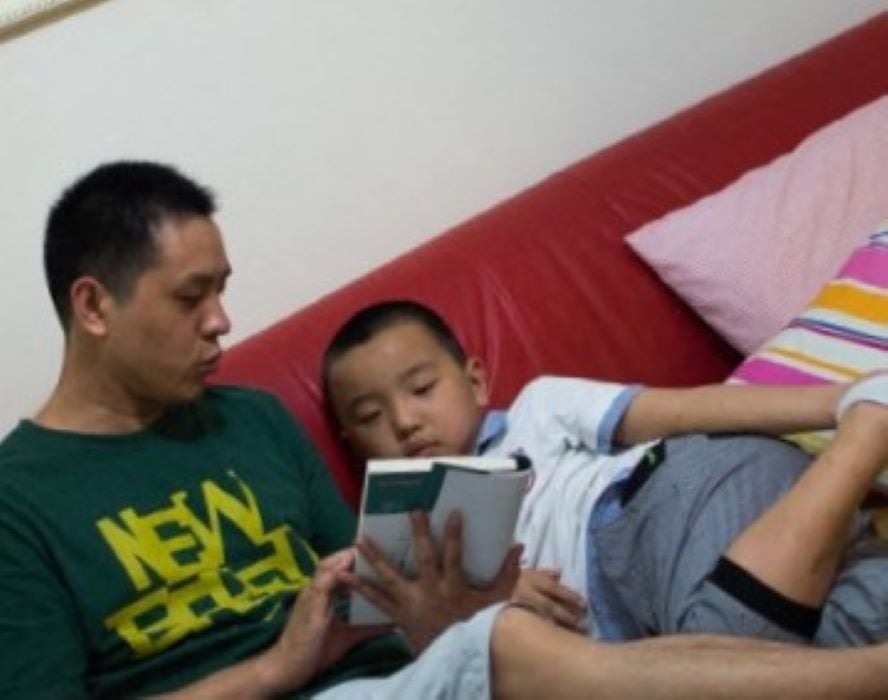‘Not easy, but worth it’: The ups and downs of raising bilingual kids in Italy

Foreigners living and raising children in Italy often want them to become native speakers of at least two languages. We asked those who’ve done it to share their tips and experiences.
Foreign residents in Italy with children understandably spend a lot of time thinking about how to best make their offspring bilingual.
The Local asked parents in Italy about their experiences with raising children to speak more than one language, and many say they believe that raising their children to be bilingual or multilingual will give them advantages in life.
“When I was pregnant with my first son back in 2018, I read as many books as I could,” Stefanie Mellano, a freelance translator and UK national with Italian heritage tells The Local.
Stefanie, who lives in Piedmont, said she flicked endlessly through the pages of ‘Bringing up a Bilingual Child’ by Rita Rosenback and ‘Maximize Your Child’s Bilingual Ability’ by Adam Beck before her now five-year-old son was born.
She follows a method called ‘one parent one language’, also known as OPOL. She speaks in English and her partner in Italian. The two parents speak to one another in Italian however.
“The books gave me great ideas and advice that I was raring to put into action,” she adds.
“Now the reality isn’t quite as easy as that, and I’ll tell you why.”
READ ALSO: 'Kids are adored here': What parenting in Italy is really like
Stefanie says dinnertime conversations are “funny”. Her partner understands what she is saying when she speaks in English to their son and he will contribute in Italian. Their son will mostly respond to them in Italian with a few words in English.
“When my son was younger, I was confident that he understood (and still does) everything I say, precisely because I never explain anything in Italian and I’ve always spoken English to him. He also would speak some English back to me.
“That became more difficult once he started preschool and I would say that now the main challenge is getting him to speak English to me.
“It’s hard trying to find a balance between letting him express himself and having him actually talk to me and tell me about his day or whatever he wants to talk about, and trying to get that out of him in English.
“However, we’ve always read books in English and when he started watching television, we made a rule that he could only watch it in English.”
READ ALSO: 'Very underfunded, very strict': What readers think of Italy's schools
When asked if their efforts have been worth it, she answers a resounding ‘yes’, adding that her son switches to English completely when he goes abroad to visit family and friends in the UK. She adds that, when her partner goes away for work, her son speaks more English too.
“He comes out with perfect sentences that make me want to cry with happiness,” she says.
Her biggest piece of advice is to never resort to the other language even if you are explaining something.
Stefanie also has a one-year-old son. “He’s too little to speak yet, but he does wave when I ask him to say bye to daddy,” she says.
While Stefanie’s experience so far has been largely positive, the same cannot be said for Paru Agarwal, an interior designer who lives in Milan.
Paru got in touch via a post on Facebook group Mothers of Milan. Her native language is Hindi whilst her husband’s is Italian.
She wanted to raise her children speaking English, Hindi and Italian, but the road was not easy. She suggested that she speak in Hindi to their first born, her husband speak in Italian, and that they speak to one another in English.
“He did not quite support my approach believing that it’s too confusing for the little baby.

A father reading to his son in English. Photo by JOHANNES EISELE / AFP.
"In a very Italian environment surrounded by all Italians only around me, I tried my best speaking in Hindi with my daughter,” she says.
She said her in-laws made the transition in speaking both languages harder as they’d come over to help out and asked Paru to translate into Italian what she said to her daughter in Hindi. On the birth of their second child, the pair eventually decided to teach their children Italian and English first of all.
“Today my kids are aged 8 and 7, and while their English is excellent and fluent, they need another year before their accent becomes neutral,” Paru says.
She also mentions she’s started sprinkling a bit of Hindi into their conversations too.
“In my experience of this, I’ve learnt not to listen to ignorance and do what you feel is best even if no one supports you,” she adds.
“I felt drained at first, but now things are looking better.”
READ MORE: 'Being bilingual has made me a more creative writer'
For some parents, such as Francesca Grilli and her husband, raising their eight-year-old daughter to be bilingual in Italian and English makes sense in the global context.
Francesca, a managing director and partner of a technology firm, says speaking English will create an abundance of opportunities. Both she and her husband are Italian.
“We’ve travelled extensively and we have friends all over the world,” she tells The Local.
“We believe our daughter shouldn’t feel excluded from conversations with our English speaking friends and their children.”
Francesca lived abroad for a period in her teens and focused on perfecting her English since.
“We never followed a method with our child,” she mentioned. “We don’t want to force anything on her and we teach her English as another way of expressing herself rather than an achievement.”
“Overall, I see raising a child to be bilingual as something positive.”
Comments (1)
See Also
Foreign residents in Italy with children understandably spend a lot of time thinking about how to best make their offspring bilingual.
The Local asked parents in Italy about their experiences with raising children to speak more than one language, and many say they believe that raising their children to be bilingual or multilingual will give them advantages in life.
“When I was pregnant with my first son back in 2018, I read as many books as I could,” Stefanie Mellano, a freelance translator and UK national with Italian heritage tells The Local.
Stefanie, who lives in Piedmont, said she flicked endlessly through the pages of ‘Bringing up a Bilingual Child’ by Rita Rosenback and ‘Maximize Your Child’s Bilingual Ability’ by Adam Beck before her now five-year-old son was born.
She follows a method called ‘one parent one language’, also known as OPOL. She speaks in English and her partner in Italian. The two parents speak to one another in Italian however.
“The books gave me great ideas and advice that I was raring to put into action,” she adds.
“Now the reality isn’t quite as easy as that, and I’ll tell you why.”
READ ALSO: 'Kids are adored here': What parenting in Italy is really like
Stefanie says dinnertime conversations are “funny”. Her partner understands what she is saying when she speaks in English to their son and he will contribute in Italian. Their son will mostly respond to them in Italian with a few words in English.
“When my son was younger, I was confident that he understood (and still does) everything I say, precisely because I never explain anything in Italian and I’ve always spoken English to him. He also would speak some English back to me.
“That became more difficult once he started preschool and I would say that now the main challenge is getting him to speak English to me.
“It’s hard trying to find a balance between letting him express himself and having him actually talk to me and tell me about his day or whatever he wants to talk about, and trying to get that out of him in English.
“However, we’ve always read books in English and when he started watching television, we made a rule that he could only watch it in English.”
READ ALSO: 'Very underfunded, very strict': What readers think of Italy's schools
When asked if their efforts have been worth it, she answers a resounding ‘yes’, adding that her son switches to English completely when he goes abroad to visit family and friends in the UK. She adds that, when her partner goes away for work, her son speaks more English too.
“He comes out with perfect sentences that make me want to cry with happiness,” she says.
Her biggest piece of advice is to never resort to the other language even if you are explaining something.
Stefanie also has a one-year-old son. “He’s too little to speak yet, but he does wave when I ask him to say bye to daddy,” she says.
While Stefanie’s experience so far has been largely positive, the same cannot be said for Paru Agarwal, an interior designer who lives in Milan.
Paru got in touch via a post on Facebook group Mothers of Milan. Her native language is Hindi whilst her husband’s is Italian.
She wanted to raise her children speaking English, Hindi and Italian, but the road was not easy. She suggested that she speak in Hindi to their first born, her husband speak in Italian, and that they speak to one another in English.
“He did not quite support my approach believing that it’s too confusing for the little baby.

"In a very Italian environment surrounded by all Italians only around me, I tried my best speaking in Hindi with my daughter,” she says.
She said her in-laws made the transition in speaking both languages harder as they’d come over to help out and asked Paru to translate into Italian what she said to her daughter in Hindi. On the birth of their second child, the pair eventually decided to teach their children Italian and English first of all.
“Today my kids are aged 8 and 7, and while their English is excellent and fluent, they need another year before their accent becomes neutral,” Paru says.
She also mentions she’s started sprinkling a bit of Hindi into their conversations too.
“In my experience of this, I’ve learnt not to listen to ignorance and do what you feel is best even if no one supports you,” she adds.
“I felt drained at first, but now things are looking better.”
READ MORE: 'Being bilingual has made me a more creative writer'
For some parents, such as Francesca Grilli and her husband, raising their eight-year-old daughter to be bilingual in Italian and English makes sense in the global context.
Francesca, a managing director and partner of a technology firm, says speaking English will create an abundance of opportunities. Both she and her husband are Italian.
“We’ve travelled extensively and we have friends all over the world,” she tells The Local.
“We believe our daughter shouldn’t feel excluded from conversations with our English speaking friends and their children.”
Francesca lived abroad for a period in her teens and focused on perfecting her English since.
“We never followed a method with our child,” she mentioned. “We don’t want to force anything on her and we teach her English as another way of expressing herself rather than an achievement.”
“Overall, I see raising a child to be bilingual as something positive.”
Join the conversation in our comments section below. Share your own views and experience and if you have a question or suggestion for our journalists then email us at [email protected].
Please keep comments civil, constructive and on topic – and make sure to read our terms of use before getting involved.
Please log in here to leave a comment.